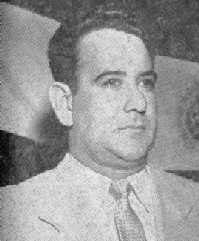José María Lemus facts for kids
Quick facts for kids
José María Lemus
|
|
|---|---|
 |
|
| 30th President of El Salvador | |
| In office 14 September 1956 – 26 October 1960 |
|
| Vice President | Humberto Costa |
| Preceded by | Óscar Osorio |
| Succeeded by | Junta of Government Eusebio Cordón Cea as President |
| Personal details | |
| Born | 22 July 1911 La Unión, El Salvador |
| Died | 31 March 1993 (aged 81) San José, Costa Rica |
| Political party | Revolutionary Party of Democratic Unification |
| Spouse | Coralia Párraga de Lemus |
| Children | 7 |
| Occupation | Politician, military |
| Military service | |
| Allegiance | |
| Branch/service | Salvadoran Army |
| Years of service | 1933–1960 |
| Rank | |
Lieutenant Colonel José María Lemus López (born July 22, 1911 – died March 31, 1993) was a military officer and politician from El Salvador. He served as the President of El Salvador from September 14, 1956, to October 26, 1960. Before becoming president, he held important roles like undersecretary of defense and minister of the interior.
Contents
Early Life and Political Journey
José María Lemus López was born in La Unión, El Salvador. His family did not have much money when he was growing up. He joined the military and later became involved in politics.
From 1948 to 1949, he worked as the undersecretary of defense. This meant he helped manage the country's military forces.
When President Óscar Osorio was finishing his term, he chose Lemus to be the next president. Lemus was known for trying to stop corruption, which is when people in power use their position for dishonest gain. This made some people unhappy.
In 1956, Lemus won the presidential election. Some people questioned the fairness of this election. As president, he brought many regular citizens into his government. He also allowed people who had been forced to leave the country to come back home.
Presidential Actions and Challenges
Lemus was a member of the Revolutionary Party of Democratic Unification. He continued some of the social and economic changes that the previous president had started. However, the everyday lives of working people did not get much better.
One important thing he did was create the Tenant Law. This law helped protect people who rented homes. It was especially helpful for those living in "Mesones" or "Vecindades." These were humble apartment buildings where many families shared bathrooms. The law said that landlords could not raise the rent by more than 10% each year. It also made written rental agreements a must, which helped protect renters.
Lemus's government also removed some laws that were used to stop people from speaking out against the government. This decision made some military leaders upset. His government also tried to control how much coffee was produced in the country. This decision made many people angry.
Around this time, the Cuban Revolution happened, which inspired many people in other countries. Soon after, there were many student protests in El Salvador. The government then arrested many people who were protesting or speaking out against it.
Overthrow and Later Life
Because of all these problems and protests, José María Lemus was removed from power. This happened in a "bloodless coup," which means he was overthrown by the military without any fighting or violence. A new, temporary government called a Junta was formed. This new government included both military officers and civilians.
After being removed from office, Lemus went to live in New York City in the United States. He lived there for many years. He later passed away in San José, Costa Rica, in 1993. He died from a type of cancer called Hodgkin's lymphoma. He left behind his wife and eight children.
See also
 In Spanish: José María Lemus para niños
In Spanish: José María Lemus para niños
 | Misty Copeland |
 | Raven Wilkinson |
 | Debra Austin |
 | Aesha Ash |

